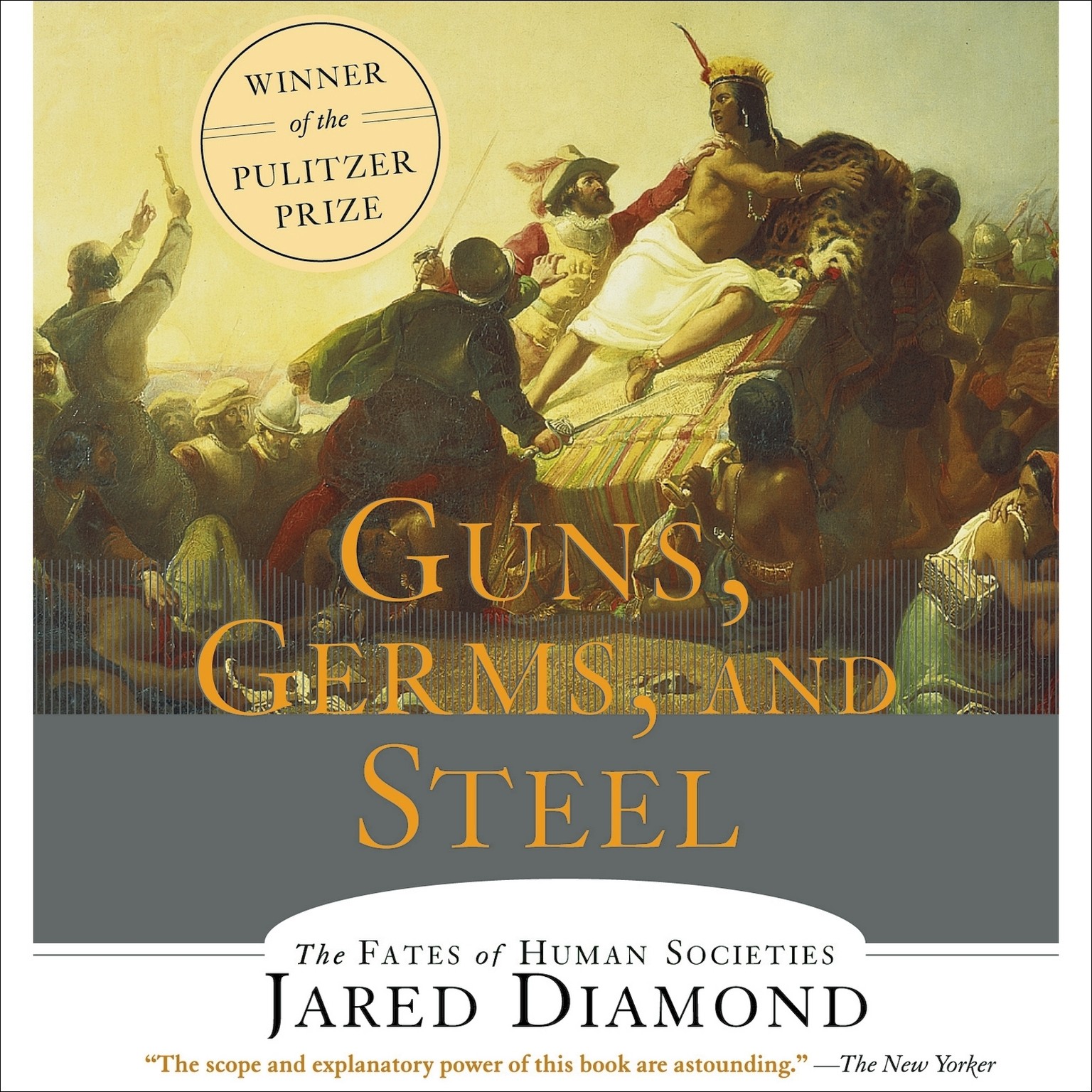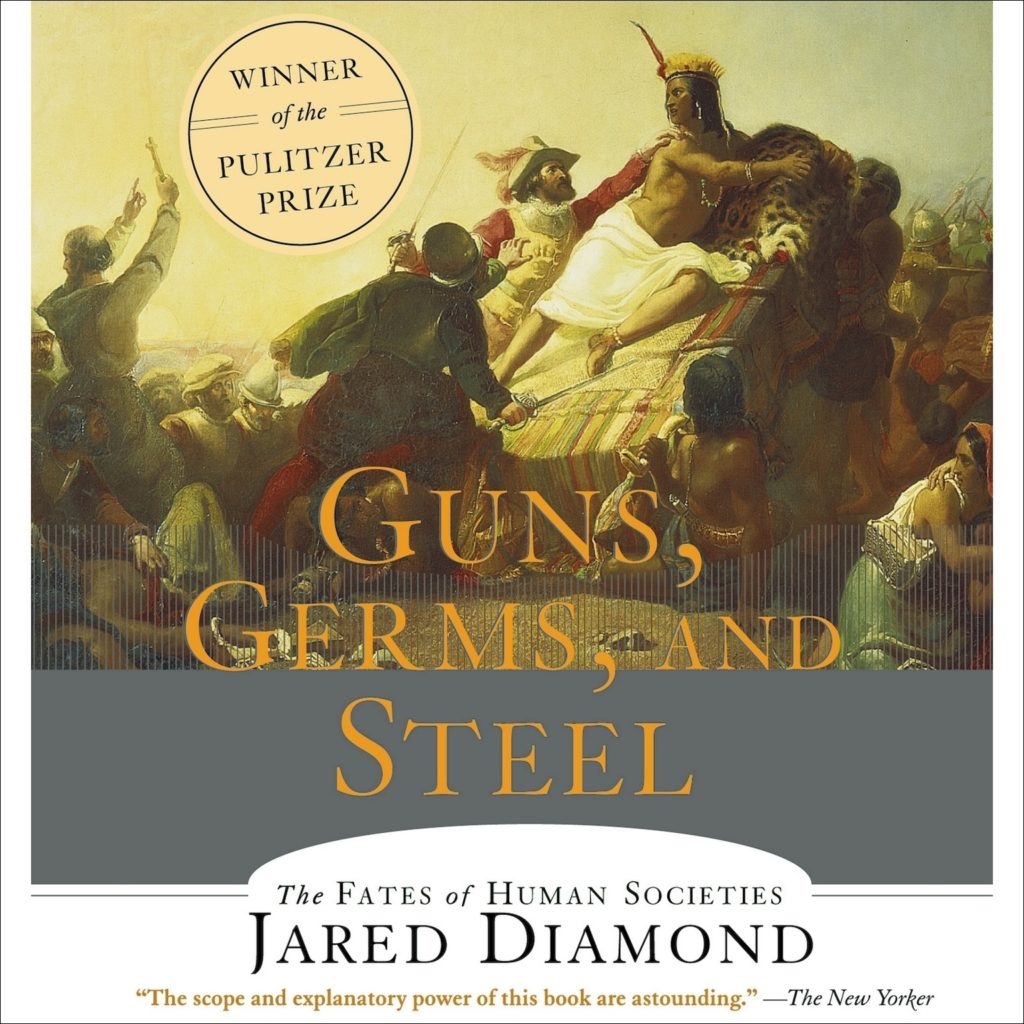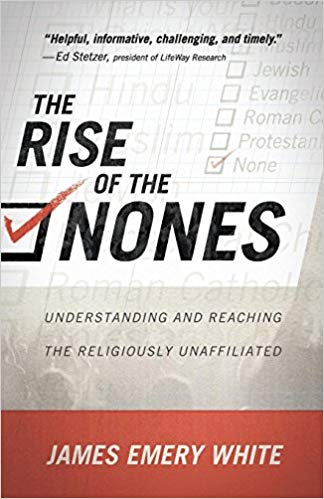
Jarod Diamond is an evolutionary Biologist who spent some 30 years in and out of the jungles of Papua New Guinea. A question asked by an indigenous tribal person sparked a decades long research project that culminated in the writing of this book. The Tribesman asked Diamond why the white people came to his Island with the big ships and amazing inventions, and not the other way around.
Why did some people groups remain locked in the stone age while others advanced into the modern era, ultimately using their superior technology to dominate, displace and in many cases all but exterminate less developed peoples?
It’s not biology — The gap in advancement between Eurasian peoples and the primitive cultures they conquered should not not be explained by means of slower evolutionary development, or anything that might construe biological inferiority. He cited all sorts of scientific data to push the reader away from such superior race conclusions, he also used many personal anecdotes from his time with tribal peoples. Diamond is absolutely convinced that “primitive” peoples minds are not less evolved than his own, in fact, he argues, to the contrary. The real question to ask, according to Diamond, is how intellectually inferior Europeans managed to invent so much stuff! Time and time again in the jungle it was the natives intellect, know how, and savvy that kept him alive. But even still, why hadn’t they figured out how to move beyond the use of stone tools and hunting and gathering as their way of life?
Location, Location, Location — Diamond is convinced that Eurasian peoples, were predisposed for success because of their environment. Diamond realizes that many a judgmental finger will be raised at this point, cursing him for his “environmental determinism”. He is quick to point out that geography is only the primary cause. Many other less deterministic causes played roles as well, but those roles must be considered secondary.
Domesticate or die — To advance, a society must be able to domesticate seeds and learn to mass produce food. Having regular crops allow a society to settle down into permanent places. Sedentary life-styles with reliable food supplies mean more population, more population increases power and the potential of invention. The domestication of animals also provides a huge leap forward in productivity and sustainability, all creating more space and time for innovation. The cold hard facts, according to Diamond, is that South and North America, Australia, and Africa simply did not have the same number of domesticable seeds available to them. In some cases, like Australia, they didn’t have any domesticable seeds at all! It also turns out that some animals can be domesticated and some can’t. The above mentioned continents just had bad luck with animals. The Eurasian horse can be tamed, the zebra cannot. The Asian bovine, from which all modern day cattle come from is domesticable, the African water buffalo and the North American bison are not. All large possibly domesticable animals went extinct in Australia giving the early inhabitant’s only the kangaroo to work with! The llama in South America was domesticated but it use pales in comparison to that of the horse. Diamond imagines how history would have been rewritten if African tribes had managed to domesticate the rhino and use it with mounted shock troops to wreak havoc all over Europe, but, alas, a rhino doesn’t take kindly to being mounted and will not be mastered.
Germs are nasty! — The possibility of sickness through germs increased as populations grew and began to cluster into cities in Europe and Asia. Natural trade routes established themselves on Eastern and Western lines and germs were free to travel. The germs that caused black death and countless other plagues ravaged Europe and Asia in the middle ages, but the old adage “What doesn’t kill you makes you stronger” certainly proved true. The unprepared immune systems of largely isolated populations of North & South America and Australia were vanquished by the germs inflicted upon them by European explorers. In some cases entire populations of indigenous people were exterminated.
Belief does impact behaviour — Indeed, one of the greatest misfortunes of the wide acceptance of Darwinian evolution is the assumption made by industrialized countries that they must be farther along in the evolutionary process and thus superior. Just like Cro-Magnon exterminated, the Neanderthal, so to must those of the modern age, destroy those of the stone age. In the last 250 years countless millions were subjugated to unspeakable atrocities on the slippery footing of these evolutionary assumptions. Diamond halts to speak of right or wrong because as an evolutionary biologist it is really difficult to speak of morality with any sort of authority. For him things must remain a matter of fact. But the facts, according to Diamonds research, prove there is no connection between intelligence and industrialization and thus any sort of racial or developmental superiority should be done away with. The harsh conclusions of inferiority levelled against less developed people have happily fallen out of favour in the main stream, however, Diamond laments that even so, these prejudices remain deep in the psyche of many moderns.
As a Christian person this is one of the reasons I am not overly thrilled to embrace wholesale the origin theories of evolution. Whenever, “lesser humans” factor into our story, there is precedent to destroy them. This of course, become more difficult, if one has the perspective that all humans are created in the image of God and thus intrinsically valuable.
The sad story of Christianity’s conquest — Unfortunately, not all who claimed Christianity as their world view developed a perspective that valued human life regardless of the state in which it was discovered. Such was the case with the conquest of the Incan empire by Pizzaro.
The story is remarkable: With brilliant trickery, superior weapons, and incredible bluster for being so totally outnumbered Pizarro and 168 soldiers defeated over 30,000 Incan warriors in one day. On that day of battle they managed to capture the Incan king and kill thousands of his soldiers without sustaining a single fatality of their own.
Several of the first hand accounts of the events remain. In them we discover a spirit of gratitude, there is thanks to God for his grace and mercy in allowing such a miraculous conquest. They sincerely believed a great victory for Jesus had been won that day. Why? Because now the infidel hordes would have a chance to learn about the love of Jesus. They would be prevented from carrying out their terrible human sacrifices, and they would learn their place, for no infidel should be in a position of authority over a Christian. What happened to Atahualpa the Incan King? After using him to extort vast amounts of gold from his people. They condemned him for conspiring against Spanish rule and sentenced him to death. However, if he converted, he would avoid being burned at the stake and receive the lesser sentence of strangulation. He converted, was baptized, and then sent to his reward in heaven. Somehow, there had to have been a better way to bring the “good news” of Jesus to South America 🙁
The curse of unity — European city states, constantly fought each other, constantly competed. This forced them to innovate, to develop, to incorporate new ideas. China on the other hand was unified and authoritarian. The emperors word was law. One or two bad idea’s by a Chinese emperor could prove to have enormous negative consequences such was the case with shipbuilding and iron smelting, China was the world leader in these two areas long before the Europeans were. But the emperor decreed that nothing good could come from the outside, so he had all of China’s ocean going ships burned and all designs destroyed. As far as iron development was concerned, the emperor, didn’t like the burgeoning middle class that was resulting from iron innovation, so he decreed all iron developments to cease and so it was. In Japan a similar situation happened. Thanks to early Portuguese exploration, Japan acquired guns. Immediately Japan saw the potential, and quickly developed advanced weapon technology, that is until the ruling class Samurai, offended that commoners could wield such deadly power, outlawed guns. An so it was.
Of course we eat humans — Diamond is so matter of fact in his writing style. In Papua New Guinea we discover cannibalism. This is easily explained. There is a lack of protein because there are no large mammals so naturally humans would eat each other. So there you have it. And so it is, with the natural world. We do what we must to survive, some people win and some people lose. Gun’s germs and steel came to Europeans and Asians because they were able to domesticate seeds and animals quicker. Asians & Middle Easterners fell behind for secondary reasons, so Europeans took over the world.
In my heart I long for more than just naturalistic explanations for what is and I find myself wanting to believe in something that transcends the natural world and gives ultimate hope. Why do I feel that way? I won’t find that answer from Diamond, but even still his explanation for why New Guineans didn’t colonize Europe, is very convincing.




